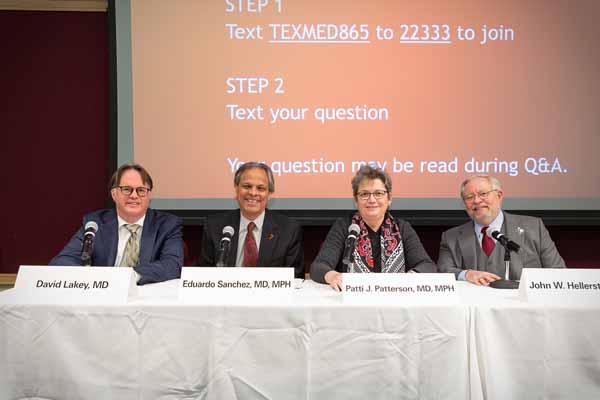
The four most recent
leaders of the Texas Department of State Health Services (DSHS) gathered earlier
this week as part of the Texas Medical Association’s Distinguished Speaker Series
to discuss policy priorities at the state’s most important public health agency.
Past commissioners David Lakey, MD; Patti Patterson, MD; and Eduardo Sanchez, MD, shared a panel with current commissioner John Hellerstedt, MD, describing how past crises have helped shaped current challenges facing the state.
On Tuesday, DSHS plans to announce the areas of "exceptional," or new, funding it will request from lawmakers in the current legislative session. Separately, the agency also plans to unveil in the near future a list of public health priorities for Texas, Dr. Hellerstedt says.
“It’s data-driven,” Dr. Hellerstedt said of the list of priorities. “But the thing I don’t want it to be is just the leading causes of death, for example. We have that, but that knowledge isn’t sufficient to change behavior. I want these public health priorities
to be a call to action.”
The commissioners agreed that Texas sometimes struggles in public health, often because of lack of funding. But Texas’ public health agencies have done exceptional work, often under trying circumstances such as responding to natural disasters and potential disease
outbreaks, says Dr. Lakey, who is now vice chancellor for health affairs and chief medical officer for The University of Texas System. Public health officials in Texas also have helped lead in addressing chronic health problems.
“There are things we do well [in public health],” Dr. Lakey said. “If you look at our tobacco-use rates, we do well compared to other states.”
Dr. Lakey stressed the importance of continuing to educate lawmakers and the public about the difference between public health initiatives and publicly funded health care. His concern was echoed by Dr. Sanchez, who said many people don’t understand the scope of the work
public health officials tackle. This can include exotic tasks, like dropping vaccines from airplanes to prevent rabies among wildlife. But it also covers aspects of daily life people now take for granted, like plumbing, clean water with fluoride, and
safe food.
“Every single day, from the moment you wake up, public health had something to do with your ability to go to the next step,” says Dr. Sanchez, who is now chief medical officer for prevention and chief of the Center for Health Metrics and Evaluation for the American
Heart Association in Dallas.
Physicians and health officials are rethinking their approach to public health because we now have a deeper understanding of the root causes of seemingly intractable health problems like drug abuse and chronic disease, says Dr. Patterson, who is now director of child abuse
pediatrics at the Texas Tech Health Sciences Center in Lubbock. In many cases, they stem from “adverse childhood experiences,” or ACEs. These are childhood traumas that can change the brain and body chemistry in ways that cause a cascade of larger health problems.
“What we often see as the problem — the obesity, the smoking, the drug use — is in fact to that person not the problem: It is their answer to the problem,” she said. “The problem very often being child maltreatment — adverse childhood experiences — physical,
emotional, sexual abuse."
Texas needs comprehensive approaches that deal with the root causes of disease and disability, rather than just addressing them as individual organs or illnesses, Dr. Patterson says.
Dr. Hellerstedt agreed that more comprehensive action is needed for most health issues, and one of DSHS’ main jobs is to coordinate that action.
"Childhood obesity is a great example of that,” he said. “It’s going to take the schools, it’s going to take the media, it’s going to take public health, it’s going to take the doctors, it’s going to take philanthropy. It’s going to take all sorts of planning
around those kinds of initiatives to change things for the better.”
Improved public health is vital because it goes hand-in-hand with the increased prosperity Texans value so much, Dr. Hellerstedt says.
"Nowadays, many employers are looking for healthy communities and are looking to see that those communities have the infrastructure in place — and the resources and commitment and philosophy — to improve the health of the entire community," he said. "And that’s where
they want to locate."
